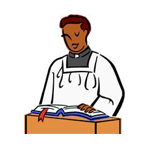During lunch with friends the other day, a retired English teacher sitting next to me bemoaned the disappearance of traditional classroom practices like diagramming sentences and labeling parts of speech.
I hope my grimace wasn’t too obvious. Folks: Those practices won’t help you become a better writer.
You need to learn usage (not grammar) – for example, how to use everyday words like I and me correctly (something many people don’t know how to do.)
And you need to know how to communicate your ideas to readers and listeners.
Here’s an example of what I’m talking about. I subscribe to an online church newsletter that I really enjoy reading – often I learn something new about theology, church history, or another topic that intrigues me.
The latest newsletter featured this sentence. It’s perfectly grammatical, but it took me several readings to figure out what it meant. The topic was the features of a new sound system installed in the church.
Another change: unless the celebrant is not the preacher, no pulpit mic will be needed. CONFUSING
Too many negatives. I would have made this two sentences (the cure for almost any writing problem, by the way!).
Another change: no pulpit mic will be needed. The only exception is when the celebrant isn’t preaching the sermon. BETTER
Or you could make both sentences positive. You might find the version below a little too folksy, but I like it:
Another change: no pulpit mic will be needed. The only exception is when someone else is preaching the sermon. BETTER
The advocates of old-time-grammar frustrate me because they’re putting huge obstacles in the way of anyone who wants to write better. Common sense and a good ear will take you a long way!


